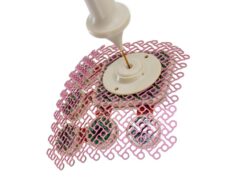
Carthera has announced today the publication of results from an investigator-sponsored pilot clinical trial evaluating safety and efficacy using its Sonocloud technology in patients with mild Alzheimer’s disease. These results are published in the journal Alzheimer’s Research and Therapy.
“The study’s findings complement the promising results already published and confirm the significant role that the Sonocloud device can play in the treatment of a wide spectrum of brain diseases, particularly if coupled with a novel drug therapy,” said Alexandre Carpentier (Assistance Publique Hôpitaux de Paris [AP-HP], Paris, France). “Carthera is actively seeking collaborations with pharma partners to further develop this technique and allow a greater number of patients to benefit from this innovative treatment.”
In the past decade, the use of low-intensity pulsed ultrasound (LIPU) has been shown to temporarily disrupt the blood-brain barrier (BBB), reduce β-amyloid and tau pathologies, and improve cognitive performance in Alzheimer’s preclinical models—according to Carthera. Sonocloud, an implantable 1MHz ultrasound device that can be activated on demand using a transdermal needle connected to an external interface, harnesses the therapeutic potential of this technique in an easy-to-use system that allows for repeated treatments in patients, the company also claims in a press release.
A translational study, which followed previous trials showing the potential of Sonocloud to safely enhance the delivery of chemotherapy to patients with brain tumours, was conducted at Hôpitaux Universitaires Pitié Salpêtrière in Paris, France by Carpentier and Stéphane Epelbaum. The goal of this study was to demonstrate the safety of this technique in patients with mild Alzheimer’s disease and to explore whether ultrasound alone could reduce their amyloid load.
A single-emitter version of the Sonocloud was implanted, under local anaesthesia, in patients with mild Alzheimer’s to target the left supramarginal gyrus, the release details. Over three-and-a-half months, seven ultrasound sessions (lasting roughly 10 minutes each) were performed twice a month on nine patients to temporarily disrupt the BBB. Positron emission tomography (PET) imaging was performed at inclusion, and at four and eight months after the initial sonications, to monitor brain metabolism and amyloid levels.
The trial, which was conducted by AP-HP, showed that the Sonocloud can disrupt the BBB in Alzheimer’s patients and further confirmed the safety previously demonstrated in patients with brain tumours via a study published in 2019 in Clinical Cancer Research. A slight decrease in amyloid load was reported in the majority of patients despite the short treatment and observation window, confirming the therapeutic potential of this modality—as has been observed in preclinical models—Carthera also claims.
“We are currently planning a clinical trial that will lead to marketing authorisation of the Sonocloud for the treatment of glioblastoma, while also continuing to explore this technology in a greater number of brain indications in combination with various therapeutic agents,” said Frédéric Sottilini, CEO of Carthera. “The outcomes of this study reinforce our conviction that the Sonocloud has the potential to unlock the efficacy of therapies for brain diseases that were previously untreatable.”













